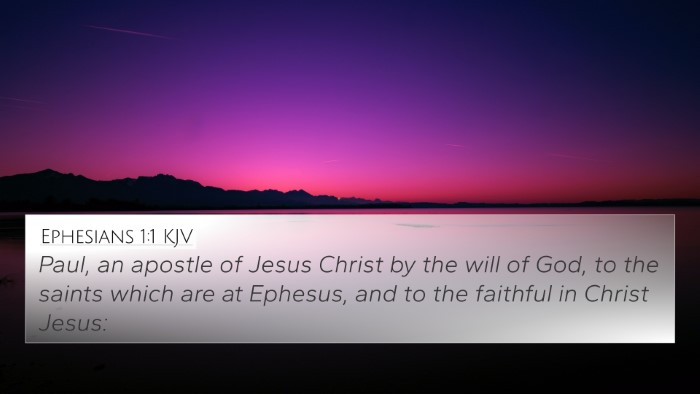Understanding Acts 26:10
Bible Verse: Acts 26:10 – "This I also did in Jerusalem: and many of the saints did I shut up in prison, having received authority from the chief priests; and when they were put to death, I gave my voice against them."
Overview of Acts 26:10
Acts 26:10 is a crucial verse in the account of the Apostle Paul as he stands before King Agrippa, defending his faith and recounting his past persecution of the Christian Church. This verse reflects Paul's zealous commitment to Judaism and his prior life before his dramatic conversion on the road to Damascus. To fully grasp the implications and meanings encapsulated in this verse, it helps to delve into various public domain commentaries.
Commentary Insights
-
Matthew Henry's Commentary:
Henry emphasizes the genuine fervor of Paul in his earlier life. He notes that Paul's actions were driven by what he believed to be the true defense of his religion. His imprisonment of Christians and his participation in their executions showcases a deep-seated zeal that is misguided. Henry posits that Paul’s transition from persecution to apostleship highlights the transformative power of God's grace.
-
Albert Barnes' Notes:
Barnes points out that Paul’s reference to his past serves to authenticate his current faith. It reinforces the idea that regardless of one’s past actions, God’s mercy can lead to redemption. Paul’s involvement in imprisoning and consenting to the execution of believers is a poignant reminder of the dramatic transformation possible through an encounter with Christ.
-
Adam Clarke's Commentary:
Clarke elaborates on the authority Paul had received from the chief priests, highlighting the structured religious order that supported religious persecution. He remarks on the gravity of Paul's actions and how they serve as a powerful testimony to the severity of Paul’s earlier life. Clarke’s insights invite reflection on the nature of authority—both religious and divine—and how it can lead one astray if not grounded in truth.
Connections to Other Bible Verses
Acts 26:10 can be cross-referenced with various Bible verses that enhance its understanding:
- Galatians 1:13-14: "For you have heard of my former conduct in Judaism, how I persecuted the church of God beyond measure and tried to destroy it." – This verse parallels Paul’s acknowledgment of his past as a persecutor.
- 1 Timothy 1:13: "Although I was formerly a blasphemer, a persecutor, and an insolent man; but I obtained mercy because I did it ignorantly in unbelief." – This shows Paul's recognition of his misdeeds.
- Acts 7:58: "And they cast him out of the city and stoned him; and the witnesses laid down their clothes at the feet of a young man named Saul." – A direct mention of Paul's early participation in the martyrdom of Stephen.
- John 16:2: "They will put you out of the synagogues; yes, the time is coming that whoever kills you will think that he offers God service." – Provides context on how religious zeal can lead to persecution.
- Philippians 3:6: "Concerning zeal, persecuting the church; concerning the righteousness which is in the law, blameless." – Highlights Paul’s prior zeal for the Jewish faith.
- Matthew 5:10: "Blessed are those who are persecuted for righteousness' sake, for theirs is the kingdom of heaven." – A contrast to Paul's past actions versus the actions of those he persecuted.
- Luke 23:34: "Then Jesus said, 'Father, forgive them, for they do not know what they do.'" – Relates to the ignorance in Paul’s previous decisions and the notion of forgiveness.
Thematic Connections
Acts 26:10 speaks to several themes that resonate within the Bible:
- The Transformation of Saul to Paul: This underscores the dramatic change that can occur in an individual’s life.
- Authority and Misguided Zeal: Examines the nature of religious authority and how it can lead to harmful actions under the guise of righteousness.
- The Power of Redemption: A core theme in the New Testament, showcasing that even the worst of sins can be washed away.
- Persecution of the Church: A recurring theme in Acts, inviting reflections on the nature of faith and resistance.
Cross-Referencing Paul's Conversion
When discussing Acts 26:10, it is beneficial to explore tools such as a Bible concordance or a Bible cross-reference guide. These resources can help identify connections between Old and New Testament texts, making it easier to see the thematic Bible verse connections present throughout scripture. Cross-referencing Biblical texts not only enriches understanding but also enhances personal study, sermon preparation, and theological reflection.
Conclusion
Acts 26:10 is a powerful verse that captures Paul’s acknowledgment of his past sins while simultaneously illustrating God's redemptive power. By examining this verse alongside insights from well-respected commentaries and cross-referencing it with other scriptures, one can gain a comprehensive understanding of its significance in the biblical narrative.
For anyone seeking to delve deeper into the Word, utilizing techniques in cross-referencing Bible study methods can uncover a wealth of insights and thematic connections across the scriptures, helping to illuminate the rich tapestry of faith found within the Bible.



















